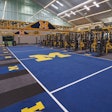Copyright 2017 The Deseret News Publishing Co.
Deseret Morning News (Salt Lake City)
SALT LAKE CITY - The governing body of the state's high school sports could look a lot different after July.
Whether those changes are made because the Utah High School Activities Association board of trustees believes it would make them more responsive and effective, or if the reorganization is part of a law that significantly revamps the state's relationship to the association is still to be determined.
The board of trustees, which creates and enforces the rules that govern high school sports, voted to reduce its membership from 30 to 15 during an emergency meeting Tuesday morning, but it did so after discussing possible legislation that would mandate the change.
"Personally, as far as the size of the board, I think it's a good direction," said North Summit Superintendent Jerre Holmes, who is a member of the board and a participant in a group discussing possible legislation that would change aspects of the UHSAA. "Not because I don't want anyone in here to have a seat at the table ... but I think there is value in making it smaller. There is a need to be more proactive and to be able to move."
The move comes after months of discussion about whether the association is accountable to anyone besides its member schools.
For nearly 90 years, the UHSAA has operated as a voluntary association of high schools that oversees and administers athletic competition for more than 80,000 students attending 151 public and private schools. The private nonprofit has operated outside of state government's direct control.
That began to shift last fall when the State Board of Education proposed a rule that not only created oversight of the association's budget and decisions, but also rewrote the rule that determines eligibility of student-athletes who transfer from one school to another.
The rule, which passed in December after months of negotiations and alterations, drew massive criticism from the public, and near unanimous opposition from the state's high school principals, mostly because they felt it wasn't the state board's role to oversee athletics.
At the same time the board members sought to have that rule rescinded, Rep. Greg Hughes, R-Draper, and House Majority Whip Francis Gibson, R-Mapleton, convened a working group to examine the same issues. Hughes assembled several superintendents, four high school coaches, a school board member, board chairwoman Kristen Betts, and the UHSAA Executive Director Rob Cuff.
"I think that what this process has needed is more transparency, where people understand what these rules are and bright lines of what the standards are out there," said Hughes. "And accountability, meaning that when decisions are made, how can someone, if they don't agree with those decisions, how do they seek recourse, and what does that look like?"
The working group started with discussions about how the association operates, how transfers are currently handled and what changes should be made.
Holmes, who is also a longtime coach, told the trustees Tuesday morning that he thought changing the makeup of the board from 30 members to 15 was better for everyone.
UHSAA lobbyist Dave Spatafore tried to address some concerns that the efforts of the working group, which will likely end in legislation, amount to being strong-armed into a compromise.
"We have a target on our backs, on our throats, and that's not going away," Spatafore said. "There is no guarantee that if we work this out, the target is going to be removed. But I guarantee, if we don't, it's not going to be removed.
Holmes responded by saying his support of the change came from an honest belief that it would make the group more responsive.
"I think we need to do it for the right reasons, rather than because we're being pressured," he said. "I just think it's the right thing to do. I don't feel like someone is forcing something down my throat."
Cuff said that only California and Texas have larger governing boards than Utah, and they each supervise more than 1,000 schools.
"I think there are ways we can still get representation from outside the 15-member board," Cuff said. "We can use standing committees, advisory boards ... there are other ways to get that representation."
Assistant Director Kim Monkres said the UHSAA staff has been on edge because it has known about the group but hasn't been given any specifics as to what's being decided. She questioned, as did others, why the association would trade the intrusion of the State School Board for the intrusion of the Legislature.
"I do not know the speaker of the house," she said. "He does not know me. ... He's never been here. These (people) are my bosses. If Jerre Holmes looks at me and says, 'You're not cutting it, Kim.' Then OK. If Tamara Lowe, the best there is, says, 'Kim, you're not cutting it.' Then I'm OK with that. But if Speaker Hughes says we're not cutting it, I'm not OK with that because he's not here, and he doesn't know us. ... He's never taken the time to come here and see how this functions. What does it mean when he decides to put his fingers deeper and deeper?"
UHSAA attorney Mark Van Wagoner questioned whether these kind of issues should be negotiated in a working group that doesn't allow participants to fully inform those they represent. He said that while there is a lot of room for the association to compromise with the State Board and legislators, there is one point on which they shouldn't negotiate.
"For me," he said, "the independence of the association has been and is one of those things."
He questioned why the association would fight so hard to resist control by the State Board of Education only to agree to control offered by legislators. He asked if they were honoring the wishes of the schools with their support of any proposal or legislation.
"My concern is that the decisions are made by an informed board and carried out precisely by everyone," Van Wagoner said. "Including me."
The trustees voted to change the makeup of the board, but they also said they wouldn't support any legislative attempt to govern the UHSAA. That message was delivered to Hughes and Gibson, even as they discussed why they felt putting some aspects of the organization in state code was important.
"I do," said Hughes when asked if state statute was the best place for these issues to be spelled out. "But I think it's a blend. I don't want to get so prescriptive in a statute that every single thing is spelled out. ... I think accountability and transparency are areas that this process was missing that hopefully when we're done here, we will have a process in place that provides it."
Hughes admits the impetus involved issues raised by Summit Academy, a charter school that complained about inconsistency in the application of eligibility rules. But his perspective has shifted as he's participated in the group discussions.
And while he believes some aspects of the association need to be spelled out in state law, the complexities of the transfer issue are better dealt with as a rule.
"What we say in public policy is that perfect can't be the enemy of good," Hughes said. "If you hold out for perfect, then what you actually end up being is an advocate for the status quo because you never actually change anything."
EMAIL: [email protected]
TWITTER: adonsports
Read More of Today's AB Headlines
Subscribe to Our Daily E-Newsletter
Terms and Conditions Privacy Policy































